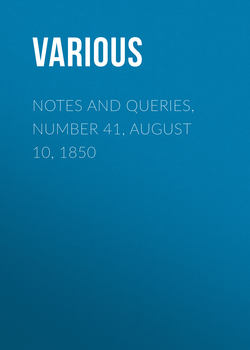Notes and Queries, Number 41, August 10, 1850

Реклама. ООО «ЛитРес», ИНН: 7719571260.
Отрывок из книги
Although you and I no doubt unite in the admiration, which all our fellow-countrymen profess, and some of them feel, for our immortal bard, yet I do not think that our zeal as Shakspearians will extend so far as to receive him as an unquestionable authority for the facts introduced into his historical plays. The utmost, I apprehend, that we should admit is, that they represent the tradition of the time in which he wrote, and even that admission we should modify by the allowance, to which every poet is entitled, of certain changes adopted for dramatic effect, and with the object of enhancing our interest in the character he is delineating.
Two facts in his Second Part of Henry IV, always referred to in connection with each other, notwithstanding the ingenious remarks on them made by Mr. Tyler in his History of Henry V., are still accepted, and principally by general readers, on Shakspeare's authority, as undoubtedly true. The one is the incident of Prince Henry's committal to prison by Chief Justice Gascoigne; and the other is the magnanimous conduct of the Prince on his accession to the throne, in continuing the Chief Justice in the office, which he had shown himself so well able to support.
.....
It is well known that Sir William Hankford was Gascoigne's successor as Chief Justice of the King's Bench, and the real question is, when he became so. Dugdale states that the date of his patent was January 29, 1414, ten months after King Henry's accession; and if this were so, the presumption would follow that Gascoigne continued Chief Justice till that time. Let us see whether facts support this presumption.
Now, Hankford was a Judge of the Common Pleas at the end of the previous reign; but he was omitted when his brethren of that court received their new patents from Henry V., which were not issued till May 2, a day or two before Easter Term. And yet we find the name of Hankford in the Year-book reports of both that and Trinity Term; and we find it, not as acting in the Common Pleas, but as ruling in the King's Bench.
.....